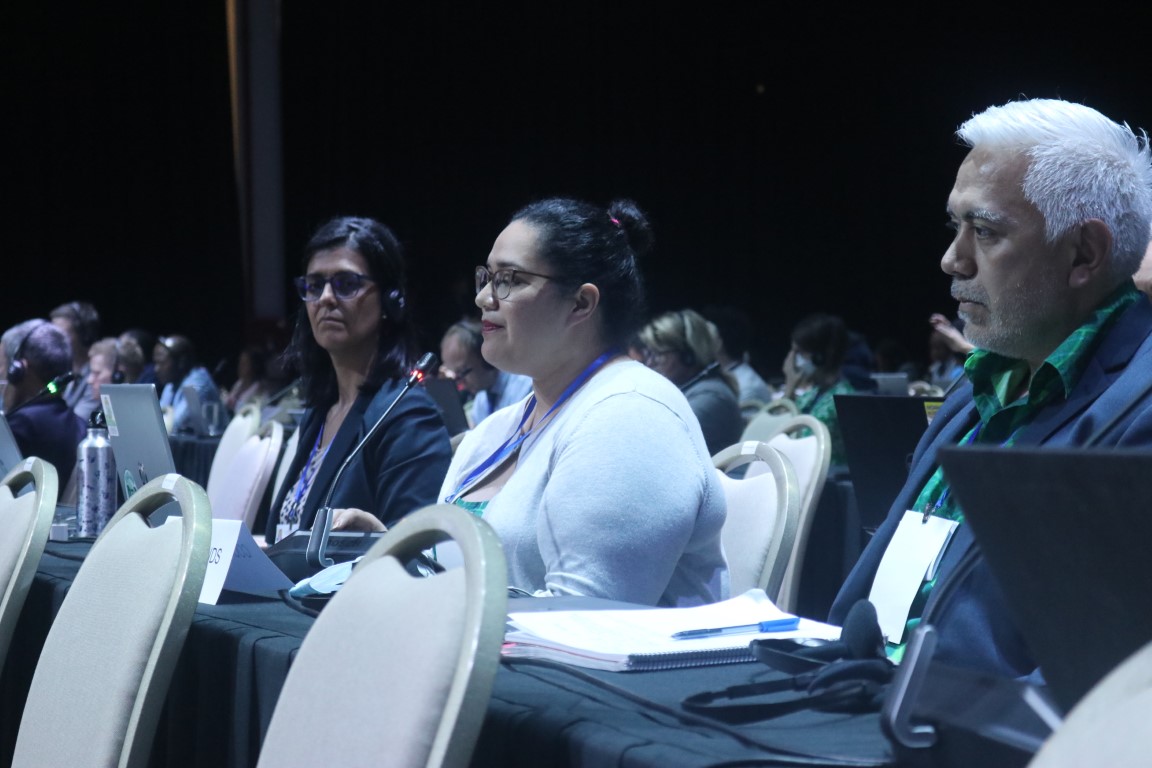Cook Islands calls for global treaty to end plastic pollution
Friday 2 December 2022 | Written by Supplied | Published in Environment, National, Regional

National Environment Service’s Tohoa Puna delivering the opening statement on behalf of the Cook Islands in Uruguay this week. The Cooks delegation of four is led by Halatoa Fua, director of National Environment Service. SPREP/22113015
An emotional plea made by the Cook Islands to over 190 countries gathered to negotiate a new treaty on plastic pollution was met with strong applause in Uruguay this week.
The First session of the International Negotiating Committee to develop a legally binding agreement on plastic pollution is now underway with expectations for a new treaty to be finalised by the end of 2024.
The Cook Islands was clear in its call for a legally binding instrument that addresses the full life cycle of plastics – starting from sourcing, upstreaming, mid-streaming and down-streaming.
“Today, my islands are overwhelmed with a plastic crisis that we cannot manage. We have overflowing waste management facilities, full of toxic waste like plastics that we bury, burn or live with,” stated Tohoa Puna of the Cook Islands as she addressed the main plenary.
“The shores of our remote islands are full of washed-up plastic waste from all over the world – we are the new colonies of others’ waste.”
Having started the negotiations of a new internationally legally binding agreement, the Cook Islands supports the development of a specific convention where core obligations and some control measures appear in the body of the instrument, giving the governing body the possibility to be adapted in the future throughout adjustment, amendments and protocols.
The island nation also promotes non-toxic circular economy approaches to addressing plastics ensuring equitable, adequate means to participate in the design of the instrument and its implementation, including support for capacity building and technology transfer.
The Cook Islands believes this should be a priority for Pacific Small Islands Developing States on the front line of the plastics pollution crisis.
“We continue to receive plastics in almost every product, toxic or non-toxic, harming our environment, our ecosystems, our food security and our health and wellbeing,” presented Puna.
“I am here today because I believe in this global treaty as our last hope to end plastic pollution. I believe that you will do the right thing and do what is right. I am here to ask that we all work together.”
Plastic is everywhere with the amount of marine litter and plastic pollution continuing to grow rapidly. The amount of plastics estimated to be in the oceans is around 75 – 199 million tons.
Plastic accounts for at least 85 per cent of the total marine waste with the equivalent of one rubbish truck of plastic waste being dumped into our ocean each minute. Approximately 7 of the 9.2 billion tonnes of plastic that was produced from 1950 to 2017, became plastic waste ending up in landfills or dumped.
For the Cook Islands, an island nation made up of 15 remote small islands lying within an Exclusive Economic Zone of close to 2 million square kilometres, the newly proposed legally binding agreement is crucial.
Puna ended her statement with a plea to all countries present, asking them to keep up the momentum to protect our future generations.
“In conclusion, I stand not only as a Cook Islander I do so as represent but as a youth and a woman, fighting for our remote communities. We must not wait until we have killed off all our marine life, replaced by plastic. We must act now and make bold steps to end plastic pollution.”
The Cook Islands is represented at the INC1 by a delegation of four led by Halatoa Fua, director of National Environment Service.
The first Intergovernmental negotiating committee to develop an international legally binding instrument on plastic pollution, including in the marine environment is taking place in Punta del Este, Uruguay from 28 November–2 December 2022.
The Pacific Islands are represented by Cook Islands, Federated States of Micronesia, Fiji, Kiribati, Niue, Palau, Papua New Guinea, Republic of the Marshall Islands, Samoa, Solomon Islands, Tuvalu and Vanuatu through the support of the Government of Australia and the United Nations.
They are supported by the Secretariat of the Pacific Regional Environment Programme (SPREP) with financial assistance from the Government of Australia. SPREP is working with partners the Office of the Pacific Ocean Commissioner, University of Newcastle, Environmental Investigation Agency, Centre for International Environmental Law, University of Wollongong, WWF and Massey University.
- SPREP




















































